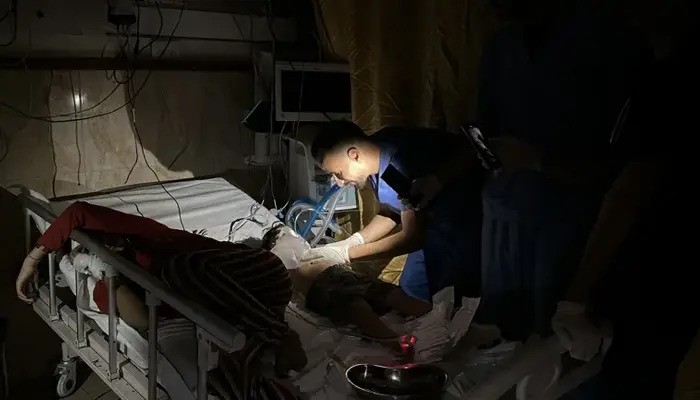At Al-Aqsa Martyrs Hospital in central Gaza, doctors now rely on mobile phone flashlights to treat patients. As fuel supplies dwindle, critical medical services are being pushed to the brink. The hospital, one of the few still operating in the region, is battling a humanitarian crisis as power outages cripple life-saving equipment.
Health workers describe scenes of desperation. “We’re using our phones to check patients’ wounds and give injections,” one exhausted nurse said. “We’ve run out of fuel. The generators could stop any minute. That would be catastrophic.”
Without fuel, the hospital cannot power ventilators, dialysis machines, or incubators for premature babies. Medical staff say they’re forced to make impossible choices, deciding who gets the limited resources and who does not. The Health Ministry in Gaza has warned that dozens of patients, including infants, could die if electricity is not restored soon.
The hospital is also struggling with shortages of medicine, bandages, and surgical tools, all while trying to care for a flood of patients injured by ongoing Israeli airstrikes.
Hopes Rise in Gaza as Ceasefire Talks Continue
Amid the suffering, a glimmer of hope has emerged. Israel and Hamas are holding indirect ceasefire talks in Doha, Qatar. The negotiations, mediated by Egyptian, Qatari, and US officials, aim to reach a long-delayed agreement to end the violence in Gaza.
On the streets of Deir al-Balah in central Gaza, people spoke of cautious optimism. Displaced families say they are clinging to hope despite the destruction around them.
“We’re really tired, we have suffered and left our homes,” said Majid Farwana, a displaced Palestinian. “Even though it’s destroyed, we’d like to clean it up and settle there at ease. I’m expecting good things.”
For many in Gaza, any sign of peace is welcome. The war has left tens of thousands displaced, wounded, or dead. Families live in overcrowded shelters, sleep on cold concrete floors, and struggle to find food, clean water, and basic sanitation.
Daily Struggles for Gaza’s Displaced Families
For people like Ahlam Farwana, life has become an exhausting struggle for survival. “We’re waiting by the minute, I swear,” she said. “We’re suffering when getting water, suffering at charity kitchens, we’re suffering with everything.”
Gaza’s residents now depend almost entirely on aid trucks for food and water. Charity-run kitchens are overwhelmed. Long queues form daily, often ending in disappointment. Fuel shortages have also made it hard to cook or boil water, adding to the misery.
“I’m asking God to end this suffering and for the end of the war,” Ahlam said. “That’s enough. No more than that. We’re tired.”
Many schools and public buildings are now makeshift shelters. However, they offer little protection from airstrikes and lack essential hygiene. Garbage piles up. Children fall sick. With no end to displacement in sight, mental health is deteriorating fast.
Fuel Crisis Threatens Broader Humanitarian Collapse
The fuel crisis is not just affecting hospitals. It threatens to collapse the entire humanitarian response in Gaza. Aid groups warn that ambulances, water pumps, and bakeries could all shut down in the coming days if fuel doesn’t arrive.
The United Nations Relief and Works Agency (UNRWA) says it is struggling to keep up with needs. “Fuel is our lifeline,” a UNRWA spokesperson said. “Without it, we can’t move aid trucks. We can’t pump water. We can’t keep clinics running.”
Despite international pledges, border crossings remain tightly restricted, especially for fuel. Israel has said it wants to prevent fuel from falling into Hamas’s hands, but aid groups argue that civilians are paying the price.
A senior official at the World Health Organization called the situation “beyond urgent.” He warned that Gaza’s healthcare system is collapsing, and without immediate international action, thousands more could die—not from bombs, but from lack of care.
Follow us on Instagram, YouTube, Facebook,, X and TikTok for latest updates
